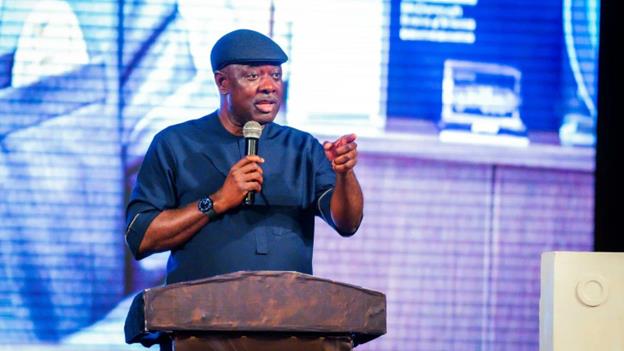The Minister of State for Petroleum, Senator Heineken Lokpobiri, has said that the full deregulation of the downstream industry, particularly prices through the removal of fuel subsidies, prevented fuel scarcity during the festive season.
Lokpobiri said this on Saturday when he made unannounced visits to various petrol stations in Yenagoa, Bayelsa State, as reported by the News Agency of Nigeria.
The Minister noted that this was the second Christmas under President Bola Tinubu’s administration that fuel was available during the festive season.
While stressing that the major goal of deregulation was to ensure the availability of petrol across the country, he noted that festive seasons in past years used to be characterised by fuel scarcity.
“You can recall that the norm has been that during festive season, when there is more demand, there is always product scarcity leading to price hikes.
“But last year there was product availability and this year also there is product availability and the prices are stabilising,” he said.
Minister urges Nigerians to suspicious meter adjustments
On his visit to Yenagoa, the Minister was accompanied by officials of the Nigerian Midstream and Downstream Petroleum Regulatory Authority (NMDPRA), and they stopped at multiple stations, including Rainoil in Edepie, an NNPC outlet also in Edepie, Rano Oil at Opolo, and the NNPC Mega Station on the Sani Abacha Expressway.
- It was reported that the purpose of the visit was to evaluate the status of fuel supply and availability following the government’s deregulation of the downstream oil sector.
- During his visit, the minister instructed pump attendants to dispense fuel so he could confirm that the amounts sold matched the displayed prices.
- Lokpobiri acknowledged the variation in prices, saying it is a testament to the positive effect of deregulation of petrol prices, following the removal of fuel subsidies.
He noted that some of the filling stations sold petrol for ₦1,050 per litre, some at ₦1,020, while the NNPC Mega Station sold it at ₦999.
“This is the true essence of deregulation. The price will stabilize, and regulators will ensure products are available to benefit Nigerians,” he said.
During the inspection, he said he noted a few discrepancies in fuel dispensing. He urged Nigerians to be vigilant when buying petrol products, and report any form of cheating or suspicious metre adjustments by any station to regulators.
“What we have seen in the past is that somebody is saying that he is selling 100 litres and what you are buying is 50 litres.
“Please look at the metres and price; if the capacity of your car tank is 100 litres and anybody claims to have dispensed 110 litres, raise the alarm.
“All of us must work together, all hands must be on deck to ensure that Nigerians get the full value and gains of deregulation,” he advised.
What you should know
President Bola Tinubu announced an end to the petrol subsidy regime as the first act of his administration on May 29, 2023. “Fuel subsidy is gone,” the President declared at his inauguration.
The price of fuel has risen to over N1,200 since then. However, a price war initiated by the Dangote refinery has led to a slight reduction in pump prices which now range from N935 to N1,100.
Indeed, there have been no reports of long queues at filling stations or hoarding this December, an unusual trend in Nigeria.
















